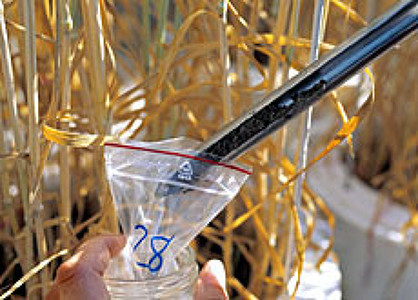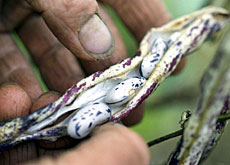Swiss consumers side with GM opponents

A negative image of genetically modified organisms (GMOs) persuaded Swiss voters to approve a five-year ban on their use in agriculture, the rival camps agree.
Final results show almost 56 per cent of voters and all the country’s 26 cantons backed a people’s initiative for a temporary moratorium on GMOs.
While those who had campaigned for a moratorium were jubilant, opponents said they would work to ensure the issues were properly explained to the Swiss people.
“Of course we are very happy and satisfied,” Daniel Ammann, from the Swiss Work Group for Genetic Engineering, a coalition against gene food technology, told swissinfo.
“I think this clear yes is proof of the political power of this alliance between farmers, consumers and environmental organisations.”
The result forces the Swiss government – which had called for the moratorium to be rejected – to place a blanket ban on the cultivation of any plant or import of any animal whose genes had been altered in the laboratory.
“I think people realised that this is a new technology with many unsolved problems and environmental and health risks,” Ammann said. “They realised it’s not the time to give the green light to the agricultural use of this technology.”
Bio-safety
At the beginning of October, Economics Minister Joseph Deiss said a moratorium on GMOs in agriculture would be bad news for farmers and consumers.
He added that a moratorium would give the wrong signal to the scientific community and would be harmful to economic sectors linked to research.
“I don’t think it’s a negative signal,” countered Ammann. “It’s a signal that research should focus on bio-safety and the development of products which are useful for agriculture.”
While Switzerland is home to many pharmaceutical firms as well as agro-chemicals group Syngenta, only around one per cent of the research performed in Switzerland involves GMOs, Ammann said.
He believes the result is good news for consumers. “If you look at all the results from the past ten years in Switzerland and in Europe, more than 70 per cent of consumers said they do not want genetically modified goods.”
Brain drain
Opponents of the moratorium included the Swiss parliament, scientists, the business community as well as the main centre-right and rightwing parties.
They argue that a 2004 ruling on GMOs already goes a long way by preventing the use of genetically modified livestock and subjecting GMO plants to a range of tests.
“[This result] is a multiple package of factors,” Klaus Ammann (no relation) from the Committee against a Gentech Moratorium told swissinfo. Ammann is an expert in transgenic crops at Bern University and also director of Bern’s Botanical Gardens.
“One is the defence of the motherland, another is the wrong kind of world view. Genetic engineering is placed with industrial agriculture, the Americans, the bad, bad President Bush and so on,” he said.
Ammann said all this added up to a negative image. “The pro-people had a very easy game to come with all sorts of pseudo-facts and half-truths because the population was ready to believe it.”
Klaus Ammann is convinced the moratorium sends out a negative signal. “I’m quite sure about that. I can see that with my colleagues – there is a brain drain going on,” he said.
Despite this setback, he is confident for the future. “I’m sure that within five years we will have much better arguments, such as the resistance of potatoes against potato blight.”
“Swiss voters are perfectly well-suited to understand complex issues but it’s a question of whether they want to. If they suck up all the bad news and don’t want to listen to the good news, then you get the situation we have now.”
swissinfo, Thomas Stephens
A proposal for a moratorium on GMOs in Swiss agriculture was accepted by 55.7% of voters and all 26 cantons.
It is only the 15th people’s initiative in modern Swiss history to be passed at the ballot box.
Turnout was average at 42%.
Swiss voters have accepted a proposal for a five-year blanket ban on genetically modified organisms (GMOs) in Swiss agriculture.
The result will force the Swiss government to put in place some of the toughest legislation on GMOs in Europe.
The European Union, of which Switzerland is not a member, ended a six-year moratorium on accepting applications for new genetically modified foods in May 2004.
But Germany and France, two of Switzerland’s neighbours, both recently voted to uphold national bans on products they deem unsafe.

In compliance with the JTI standards
More: SWI swissinfo.ch certified by the Journalism Trust Initiative













You can find an overview of ongoing debates with our journalists here . Please join us!
If you want to start a conversation about a topic raised in this article or want to report factual errors, email us at english@swissinfo.ch.